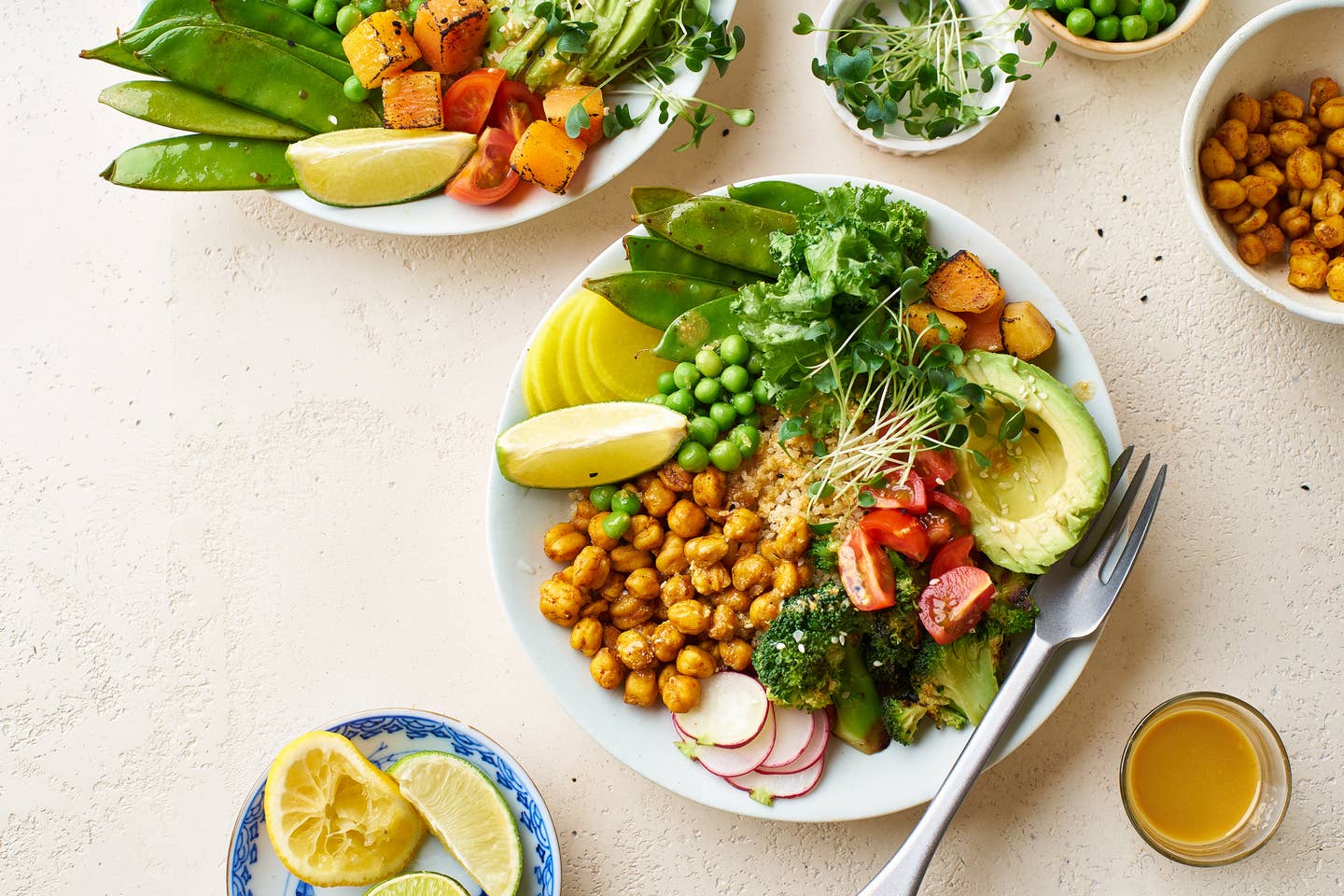
What is Vegan Collagen? Here’s How to Boost It Naturally, According to Experts
Collagen is one of the hottest beauty trends these days, its claims to fame being healthier hair, nails, skin, bones, and joints. And although collagen is typically sourced from animal products, vegan collagen boosters are starting to roll out. So should you rush out to buy supplements that feature vegan collagen? Not so fast, say experts. Here’s why.
What is Collagen?
Collagen is the most abundant protein in the human body, making up about a third of all proteins in your body, says Charlotte Martin, M.S., R.D.N., author of The Plant Forward Solution and dietitian in Baltimore, Md.
It’s a key component of cartilage and one of the main building blocks for your bones, muscles, tendons, ligaments, eyeballs, blood vessels, teeth, and skin. “Collagen is actually a collection of different groupings of fibers that give strength and flexibility to your body, known as connective tissue,” says Jessica Krant, M.D., M.P.H., assistant clinical professor of dermatology at SUNY Downstate Medical Center in Brooklyn, N.Y., and board-certified dermatologist with the Laser & Skin Surgery Center of New York. One surprise about collagen? “Contrary to popular belief, collagen itself is not directly part of your hair strands and nail plates but does play a big role in the health of your hair follicles and nail beds.”
Where Does Collagen Come from?
Your body actually makes collagen on its own by breaking down the proteins you eat to get amino acids. “Once it does that, your body can re-purpose the amino acids into collagen (and other proteins throughout the body) with the help of certain vitamins and minerals, specifically vitamin C, zinc, and copper,” Martin says.
Of course, most people think you have to eat animals to kick this collagen-building process into gear, but this isn’t true. For starters, “only a small percentage of muscle meat is collagen,” Martin says. Most collagen is found in connective tissue like cartilage, bones, tendons, ligaments, skins, and hides. One reason collagen supplements are typically derived from the bones and skin of cows, pigs, and fish. So unless you’re eating the skin of these animals, you’re not getting much collagen. You will, though, get protein which your body will use to make collagen.
Yet remember that while animal foods are the main source of protein in the standard American diet, plants provide a viable – and by many experts’ definition, healthier – source of protein. “Much like cows, gorillas, elephants, and other strong animals full of collagen, you can easily get all of the building blocks you need to create abundant collagen from eating a widely varied plant-based diet,” Krant says. Note, of course, that all of the animals she’s mentioned are herbivores who munch plants for their protein.
The bummer, though? Numerous factors can decrease collagen in your body, age is one of the biggest. “Collagen production begins to slow with age,” Krant says. What’s more, “collagen quality deteriorates and becomes more brittle.” As a result, your skin gets thinner and saggier, your bones become more brittle, your joints become less flexible, and your hair and nails may not grow as well.
Other factors like pollution, sun exposure, smoking, alcohol, and other external toxins can accelerate collagen damage and reduce your body’s ability to make more, Krant adds.
Should You Take Collagen?
That natural decline in collagen has many people scrambling for supplements, and companies have responded, pumping out animal-derived collagen supplements in droves. Whether they work is still being teased out in research. “Although more research is needed, it’s possible,” Martin says.
Even Krant, who used to believe collagen supplementation was a myth, largely because omnivores could eat the collagen itself, says there may be some benefits to non-vegan collagen supplementation, based on her colleagues’ review of studies. Yet she’s quick to note that this may be more true for people who don’t eat a varied diet with lots of fruits, vegetables, and other “collagen creation cofactors” like nuts and seeds.
Vegan and Plant-Based Collagen
Animal-derived collagen is, of course, a no-go for vegans and people who want to eat fewer animals, and vegan collagen simply doesn’t exist. To address this, companies have instead started producing vegan collagen boosters, which contain many of the common building blocks of collagen as well as cofactors necessary to build it, such as vitamin C and minerals like zinc and copper, Krant says.
Could they work? Possibly, although the data to support their use is scant, there may be a caveat. “While these vegan ‘collagen’ supplements could potentially help support your body’s natural collagen production, they’re most likely only beneficial if you’re deficient in these nutrients (like vitamin C and zinc),” Martin says.
At this time, neither Martin nor Krant recommends taking vegan collagen boosters. Instead, they suggest giving your body the foods it needs to make its own collagen. A great starting point? “Honor Dr. Will Busieiwcz’s recommendation to eat 30 different plant foods each week, including nuts and seeds, brightly colored fruits and vegetables, and whole grains,” Krant says.
“If you eat a variety of plant foods, you’ll get more than enough of the amino acid building blocks and the other nutrients that your body needs to make collagen.”
Foods for Collagen Production
- Vitamin C: Bell peppers, citrus, broccoli
- Zinc: Seeds, nuts, spinach, oats
- Silica: Green beans, bamboo
Bottom Line: For Healthy Skin, Eat Plant-Based to Boost Collagen.
If you are deficient in protein or other nutrients that support collagen production, consider adding a vegan protein powder to your routine and increase your intake of food sources of these nutrients, Martin says. Then, take steps to prevent some of the decline in collagen by not smoking, avoiding sun exposure, and limiting your alcohol intake.
For more expert advice, visit The Beet's Health & Nutrition articles.
More From The Beet






